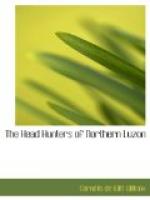We enter the Mountain Province.—Payawan.—Kiangan, its position.—Anitos.—Speech of welcome by Ifugao chief.—Detachment of native Constabulary.—Visit of Ifugao chiefs to our quarters.—Dancing.
We were now on the borders of the Mountain Province; literally one more river to cross, and we should turn our backs on Nueva Vizcaya. And with regret, for it is a beautiful smiling province, of fertile soil, of polite and hospitable people, of lovely mountains, limpid streams and triumphant forests. In Dampier’s quaint words, spoken of another province, but equally true of this one, “The Valleys are well moistened with pleasant Brooks, and small Rivers of delicate Water; and have Trees of divers sorts flourishing and green all the Year.” [20] Its people lack energy, perhaps because they have no roads; it may be equally true that they lack roads because they have no energy. However this may be, the province can and some day will grow coffee, tobacco, rice, and cocoa to perfection; its savannahs will furnish pasturage for thousands of cattle, where now some one solitary carabao serves only to mark the solitude in which he stands.
We crossed the stream about seven in the morning, May 1, and opened out on an immense field, which we estimated at about thirty-five hundred acres, a whole plantation in a ring fence, and offering not the slightest suggestion of the tropics in its aspect. The ground now broke and we went on down to a bold stream so deep that those of us riding ponies got wet above the knees and were almost swept down by the current. The cogon grass in this river bottom was the tallest I ever saw, some clumps being well over twenty feet high. Then we began to climb till we reached another divide, across the stream at the foot of which was Payawan, our immediate objective. Payawan consists of two shacks and a name. Here we were to have had our first meeting with the clans of the Ifugao, but through some misunderstanding they took the place of meeting to be at Kiangan, some, miles further on; so we all rested a while, and some of us took a swim in the little river we had just crossed, finding the water on first shock almost cold, but delightful beyond belief. Cootes and I were quite satisfied with the pool we found near the shack, but Strong and the rest thought they saw a better one downstream, so they crawled in the water around a small cliff, reached their pool, and then had to walk a mile and a half through the cogon and in the sun to return, there being no getting back upstream. Now, if there is anything else hotter on the face of the earth than a walk through the cogon in the dry season with the sun shining vertically down, it has yet to be discovered.




